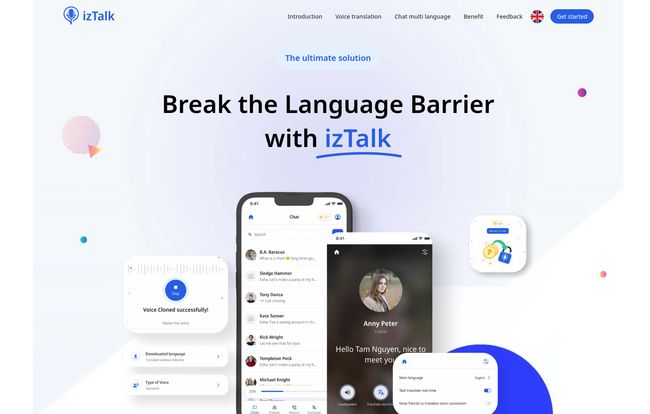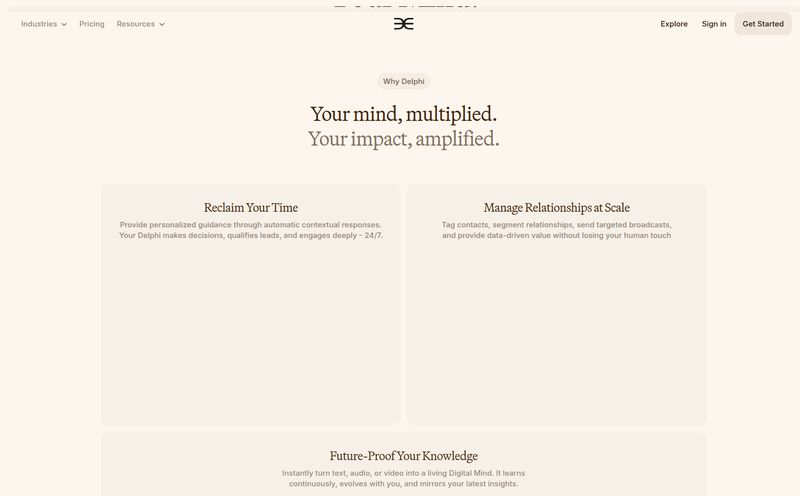In the world of SEO and digital marketing, we're drowning in AI tools. Every week, there's a new 'game-changer' that promises to write your content, design your graphics, and probably walk your dog. Most of them are... fine. A few are genuinely useful. But every now and then, something pops up that makes you go, "Huh. Now that's interesting."
That was me a few days ago when I stumbled upon izTalk. The promise is huge and simple: Break the language barrier. Not with clunky, delayed text translations, but with real-time, AI-powered voice translation. It sounds like something straight out of Star Trek. A universal translator. A real-life Babel fish for anyone who's ever found themselves awkwardly miming "where is the bathroom?" in a foreign country.
But as a seasoned (read: slightly cynical) tech-watcher, I've learned that big promises often come with big asterisks. So, I decided to take a closer look. Is izTalk the ultimate solution it claims to be, or is it just another drop in the AI ocean? Let's get into it.

Visit izTalk
What on Earth is izTalk, Anyway?
At its core, izTalk is an AI translation platform designed for communication. Think beyond just typing a phrase into Google Translate. This is meant for live interactions—phone calls, video conferences, and even face-to-face chats. The goal is to make talking to someone who speaks a different language feel as natural as talking to your neighbor. A lofty goal, for sure.
The platform is built around the idea of instantaneous, smooth conversation. It wants to eliminate those awkward, conversation-killing pauses that happen when you're waiting for a translation app to catch up. For anyone who's tried to have a meaningful business call or even a simple personal chat through a traditional translator, you know exactly the pain point they're trying to solve.
The Magic Under the Hood: Breaking Down izTalk's Features
So how does it propose to do all this? From what I've gathered, it boils down to three core features that work together. Some are expected, and one is... well, a little bit sci-fi.
Real-Time Voice Translation: The Star of the Show
This is the main event. izTalk's landing page talks a big game about "crystal clear audio" and "instantaneous translation." The idea is that as you're speaking, the AI is translating and delivering your words in the other person's language, and vice-versa. The key here is latency. For a tool like this to work, the delay has to be almost non-existent. Any noticeable lag and the 'natural' feeling is completely lost.
I can immediately see the use cases. International business is the obvious one. Imagine closing a deal with a partner in Japan without needing to hire a human interpreter for every single call. Or for remote teams with members spread across the globe—this could make daily stand-ups so much more efficient. And for travelers? It’s a game-changer. No more pointing and grunting in a Parisian bakery.
Not Just Talk: Multi-Language Chat
Of course, it's not all about voice. izTalk also includes multi-language chat translation. This is less revolutionary, as we've seen similar features in apps like Skype and Telegram for a while. However, having it integrated into the same platform as the voice feature makes a lot of sense. You can seamlessly switch between a call and a follow-up text, with all the translation handled in one place. It’s about creating a complete communication ecosystem, which I can appreciate. It keeps things tidy.
The Sci-Fi Twist: AI Voice Cloning
Okay, here’s where it gets interesting and maybe a tiny bit unnerving. izTalk features AI voice cloning. The concept is that instead of the translation being read out in a generic, robotic Siri voice, it can be delivered in a cloned version of your own voice. So, the person on the other end hears your words, in their language, but with the tone and cadence of... well, you.
On one hand, this is brilliant. One of the biggest things lost in translation is personality. If the AI can preserve the speaker's vocal characteristics, it could make cross-language conversations feel incredibly personal and authentic. On the other hand, the words "AI voice cloning" immediately bring up privacy and security questions for me. The platform states it's secure, but in an age of deepfakes, you can't help but be a little cautious. It’s a powerful feature, but one that needs to be handled with incredible responsibility.
My Honest Take: The Good, The Bad, and The... Intriguing
No tool is perfect. After poking around, here's my breakdown of what gets me excited and what gives me pause.
The upside is massive. A user-friendly tool that genuinely bridges language gaps in real time is a holy grail of communication tech. For global businesses, content creators with international audiences, or just avid travelers, the utility is undeniable. The combination of voice, chat, and that unique voice cloning feature creates a really compelling package. It’s ambitious, and I love ambition.
However, let's talk about the potential snags. The entire system hinges on the accuracy of the AI translation. Anyone who has used translation software knows it can sometimes miss nuance, idioms, or cultural context. A mistranslation in a casual chat is funny; in a legal or medical conversation, it could be disastrous. Then there's the voice cloning. As cool as it is, I have questions about data privacy. Where are those voiceprints stored? How are they protected? These are questions any potential user, especially in a corporate setting, should be asking.
The Million-Dollar Question: What's the Price Tag?
And now for the part that always frustrates me with new and upcoming platforms. I couldn't find any pricing information. Anywhere. The pricing page on their site seems to lead to a 404 error, which suggests the site might still be a work in progress. Is it a subscription model? Pay-as-you-go per minute? Freemium? We just don’t know.
This lack of transparency is a pet peeve of mine. As a business owner, I want to know what I'm getting into before I invest time setting up a new tool. I'm hoping this is just a temporary oversight as they finalize their launch, because hiding your pricing is a surefire way to lose potential customers.
Who Is This Tool Really For?
Assuming the technology delivers and the pricing is reasonable, who stands to benefit the most?
- International Business Professionals: This is the most obvious group. Sales teams, executives, and global project managers could streamline communication and build better relationships.
- Content Creators & Podcasters: Imagine recording a podcast interview with someone from another country, with both of you speaking your native language. The potential to reach a global audience is huge.
- Frequent Travelers: For the modern-day nomad, this could be an essential app for everything from ordering food to making genuine connections with locals.
- Families & Friends: People with family members or loved ones who speak different languages could find this tool to be an incredible way to connect on a deeper level.
Frequently Asked Questions about izTalk
- What exactly is izTalk?
- izTalk is an AI-powered application designed for real-time communication across different languages. It offers live voice translation for calls and meetings, multi-language chat, and an AI feature that can clone your voice for the translated audio.
- How does the AI voice cloning feature work?
- While the exact tech isn't detailed, the principle is that the AI analyzes a sample of your voice to capture its unique characteristics (pitch, tone, cadence). It then uses this model to generate the translated audio, making it sound more like you and less like a standard text-to-speech robot.
- Is using izTalk and its voice cloning secure?
- izTalk claims its platform is secure. However, as with any service that handles biometric data like your voiceprint, it's wise to be cautious. We'd recommend looking for a detailed privacy policy from the company before using the feature for sensitive conversations.
- What languages does izTalk support?
- The platform is stated to have "extensive language support," but a specific list isn't readily available on their main site. You would likely need to check within the app itself for an up-to-date list of supported languages.
- Is izTalk a free service?
- Currently, there is no public information on the cost of izTalk. The pricing page is not active, so it's unclear if it will be a free, freemium, or paid subscription service.
- Can I use izTalk for professional business meetings?
- Absolutely. In fact, this seems to be one of its primary use cases. The ability to conduct smooth, real-time translated conferences could be incredibly valuable for global businesses. Just be mindful of the translation accuracy for highly technical or legal discussions.
Final Thoughts
So, what's the verdict on izTalk? I'm cautiously optimistic. The concept is fantastic, and if the execution matches the ambition, it could genuinely change how we think about global communication. It's more than just a tool; it's a bridge.
However, the question marks around pricing and the practical/ethical implications of voice cloning keep me from giving it a wholehearted, no-reservations endorsement just yet. I'm putting izTalk firmly in my "watch this space" category. The potential is enormous, but as always, the devil is in the details. If they can nail the tech, be transparent with their pricing, and address privacy concerns head-on, they might just have the ultimate solution they claim to be.
Reference and Sources
- izTalk Official Website: While some pages were under construction at the time of this review, you can find their main landing page at their official domain. (Note: A direct link isn't provided as the site structure appears to be in flux, but it can be found via a web search for "izTalk AI translation").



